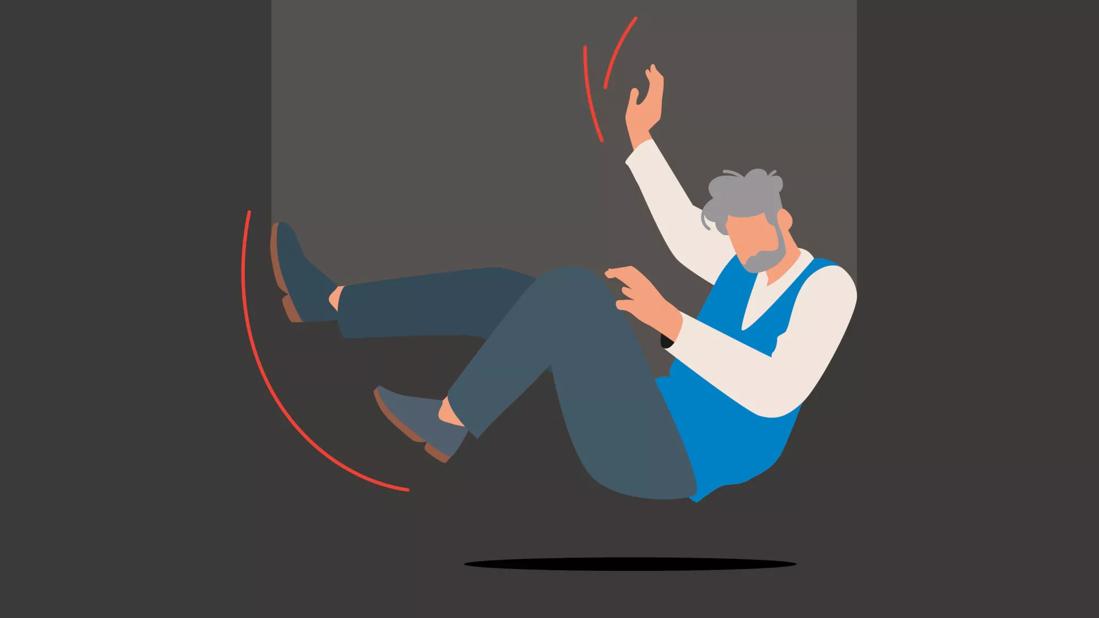Staying active and doing what you love may increase both your confidence and your balance

Image content: This image is available to view online.
View image online (https://assets.clevelandclinic.org/transform/7db1318f-8113-47c0-8e70-96f27a0752e4/Fear-Of-Falling-1359748957-770x533-1-scaled_jpg)
person falling
Are you worrying more about losing your balance as you get older? It’s perfectly normal to worry about falling — and it does happen more often as people age.
Advertisement
Cleveland Clinic is a non-profit academic medical center. Advertising on our site helps support our mission. We do not endorse non-Cleveland Clinic products or services. Policy
But you don’t have to just live with that fear. In fact, gaining confidence in your gait doesn’t only improve your quality of life. It can — both directly and indirectly — improve your balance, too.
We talked to audiologist and balance disorder expert Julie Honaker, PhD, about basiphobia (fear of falling). She explains where it comes from, why it can compromise your balance and how to overcome it.
The fear of falling is a natural instinct that most humans and animals have, to some extent. And that’s a good thing. It helps us stay out of unnecessarily dangerous situations and encourages us to be careful when making our way about the world.
But, of course, accidents happen. We all fall from time to time, regardless of our age or health status. That said, falls do tend to occur more often as we get older.
As we age, a number of different changes can cause us to develop balancing issues. Problems with vision, the inner ear or the sense of touch in a person’s feet and ankles are often at work. These balance issues also can lead to poor muscle control.
The result? About one-third of older adults fall annually.
It’s natural to want to protect yourself from harm, but the fear of falling can go too far. And the consequences for your health can be significant.
Advertisement
Basiphobia can present in many different ways. The following are signs that it’s time to have a discussion with a healthcare provider:
Fear of falling is a product of experience. That experience may be yours, but it doesn’t have to be. After all, we all know somebody who’s experienced a life-changing fall.
“Those who fall develop a greater fear of falling,” Dr. Honaker explains. “But even those who don’t fall can develop the fear if they have a friend or loved one who’s fallen. They know the consequences of the injuries and how it can impact their independence.”
Developing a fear of falling can set people up for a negative pattern, Dr. Honaker notes. The uncertainty and lack of confidence may lead people to withdraw from activities they enjoy. Doing so can worsen their balance and make participation even more difficult. “This all puts a person at a greater risk of falling,” she continues. “It’s a vicious cycle that can limit people’s independence.”
Some people also tighten their muscles when the feel they’re about to fall. Dr. Honaker adds that this stiffening can limit a person’s range of motion and make a fall more likely.
While it’s common to experience fear in the aftermath of a fall — be it yours or somebody else’s — Dr. Honaker says it’s important to be aware of this tendency and work against it. “Do everything you can to continue staying engaged in activities,” she urges.
Here are a few ways to rebuild your confidence:
Advertisement
A fear of falling (basiphobia) is a natural fear that helps keep us safe. But as we get older and more unsteady on our feet, that fear can severely impact our quality of life. If you’re limiting your activities out of concern over falling, you may actually be increasing your risk. That’s because being active helps us preserve the strength and flexibility we need to maintain our balance.
If you’re worried that staying active puts you in danger, talk to your primary care provider. They can assess your fall risk and recommend next steps.
Advertisement

Sign up for our Health Essentials emails for expert guidance on nutrition, fitness, sleep, skin care and more.
Learn more about our editorial process.
Advertisement
Building lower body strength is key to staying upright, particularly as you age
A study found that you might live longer if you can stand on one leg — but it’s far from a perfect indication of longevity
Is it clumsiness or something more serious?
Exploring mal de debarquement
This spinning sensation is a symptom, not a condition, so you need to know what’s causing it before you can treat it
Your tolerance decreases with age, thanks to body changes, health conditions and medications you may take
Age is the most likely reason for typical graying, but premature graying may be caused by stress, diet, smoking or autoimmune disease
Couples counseling and communication are key to addressing built-up issues and changing needs
Although it could be used as a moisturizer, this new trend is not recommended
Communicating clear limits helps protect your time, energy and emotional well-being
High cholesterol can be genetic, but testing and treatment can lower your heart disease risk